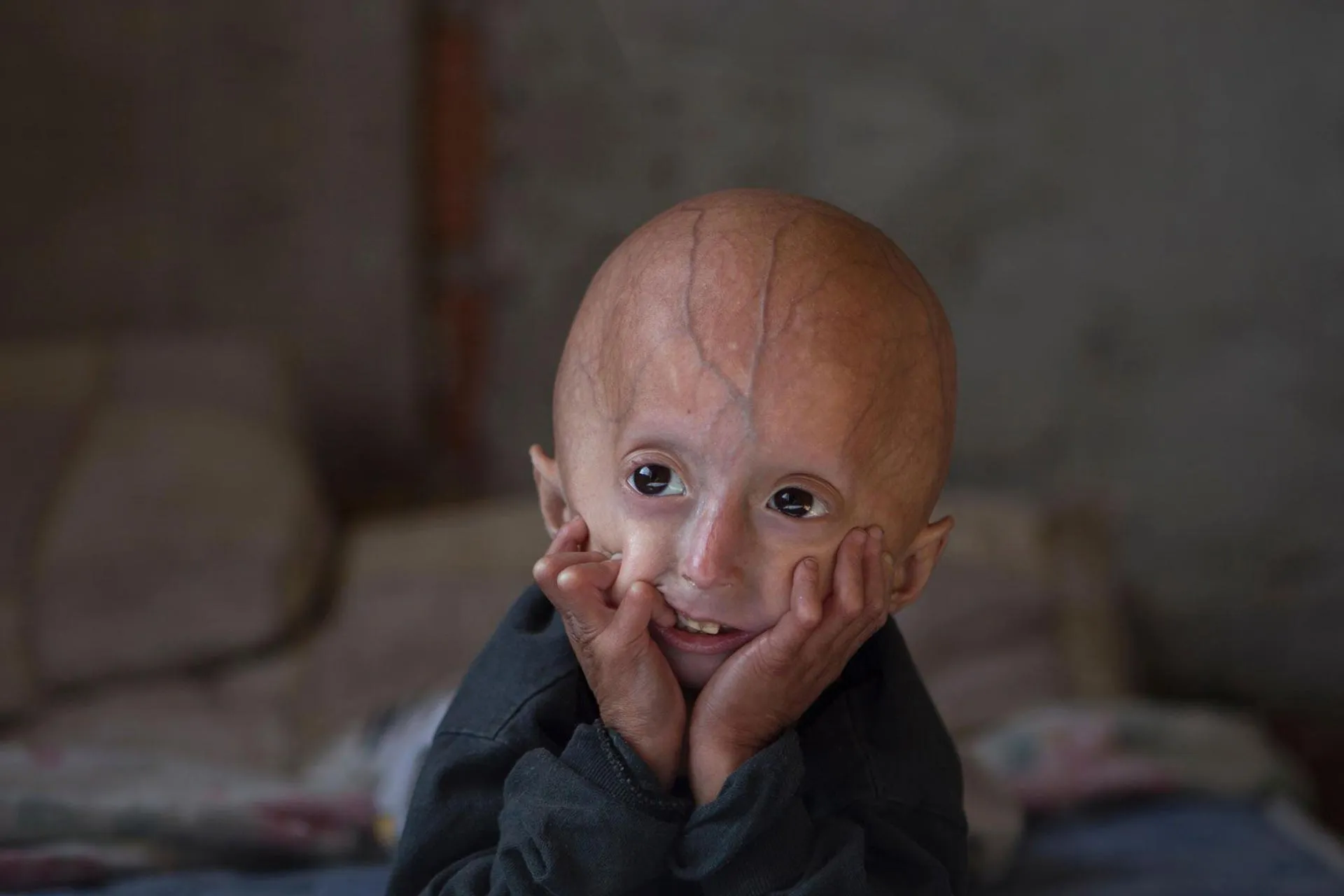Paediatrician | 6 min read
Progeria: Symptoms, Causes and Treatment
Medically reviewed by
Table of Content
Synopsis
Progeria is a rare genetic disorder that causes accelerated aging in children. Progeria is also called Hutchinson-Gilford Progeria Syndrome (HGPS) or Seip-Berardinelli Syndrome. A mutation in the LMNA gene causes Progeria.
Key Takeaways
- Progeria is a very rare genetic disorder that causes children to age prematurely
- A mutation in this gene might cause the protein to be produced incorrectly, leading to cellular changes
- There is currently no cure for Progeria, but certain treatments can help improve the situation
Progeria is a rare and fatal disorder that causes a child to age rapidly. The child may look like an older person, but they are only a few years old. A genetic mutation causes Progeria, and there is currently no cure. This disorder is extremely rare, occurring in only one out of every four million births. It affects both sexes and all races equally. Progeria is not hereditary, meaning it cannot be passed down from parents to children. There is currently no treatment for Progeria, but researchers are working on finding a way to stop the disorder's progression. In the meantime, children with Progeria can receive supportive care to help them manage the symptoms.
A mutation in the LMNA gene causes Progeria. This gene provides instructions for making a protein that is essential for the normal function of lamin A, a type of protein that helps maintain the structure of cells. The mutation produces an abnormal form of lamin A, which interferes with the normal function of lamin A and other proteins. This disrupts cells' normal structure and function, leading to Progeria's signs and symptoms.
Progeria Symptoms
Progeria is a sporadic genetic disorder that causes children to age prematurely. The most common symptom of Progeria is a distinctive appearance, with children often having a small head, large ears, and a narrow face. Other Progeria symptoms can include joint stiffness, growth problems, heart disease, and other issues listed below:
- Wrinkled skin
- Weakness
- Loss of mobility
- Joint stiffness
- Cardiovascular problems
- Growth problems
- Heart disease
- Loss of hair

Progeria Causes
It is a rare syndrome that is responsible for rapid aging in children. The cause of Progeria is still unknown, but several theories attempt to explain this condition. One theory suggests that Progeria is caused by a mutation in the LMNA gene. This gene is responsible for producing a protein that helps keep our cells healthy. A mutation in this gene might cause the protein to be produced incorrectly, leading to cellular changes.
Another theory [1] suggests that a problem with telomeres causes Progeria syndrome. Telomeres are the tips of our chromosomes, and they help protect our DNA. Each time a cell divides, the telomeres get shorter. In people with Progeria, it is thought that the telomeres shorten at a much-accelerated rate.
Signs to Notice for Progeria
Progeria is an extremely rare genetic disorder that causes premature aging in children. The average life expectancy for a child with Progeria is just 13 years, although some children with the condition have been known to live into their 20s. The most noticeable symptom of Progeria is that affected children grow much slower than other children their age. They also tend to have thin, fragile skin that bruises easily and hair that appears thin, sparse, and prematurely gray. Most children with Progeria also have a distinctive facial appearance - a small head, large eyes, and a narrow face.
Progeria Diagnosis and Treatment
There is currently no cure for Progeria, but treatments available can help improve the quality of life for those affected by the disorder. Treatments include drugs that can help reduce the rate of cell damage and lifestyle changes that can help improve heart health and slow the disorder's progression. For example, GH therapy is a treatment that can help to increase growth rates in children with Progeria.
Other treatments include statins, which can help to lower cholesterol levels and help improve heart health, and aspirin, which can help to prevent blood clots. Additionally, a healthy diet and exercise are important for all Progeria patients. This proves that nutrition for children also has a vital role to play.
Despite its rarity, Progeria is an important disorder to be aware of because:
- Progeria can cause problems with blood vessels and the supply of blood to the heart, causing heart attacks and congestive heart failures.
- Progeria also affects the blood supply to the brain, resulting in strokes
- Growth in the first few years is also severely affected by Progeria
Early diagnosis and treatment of Progeria can improve the health of the affected.

Lifestyle Changes
Progeria can be helped significantly with the help of lifestyle changes. This will result in the betterment of the patient's overall health. Progeria symptoms can be delayed if the patient keeps their general health in check. Eating healthy and living an active life can lower the severity of progeria symptoms.
A healthy lifestyle promotes a longer lifespan for progeria patients. Proper nutrition, fluids, and regular exercise can reduce the issues related to this ailment in children and adults alike.
Surgery
Surgery or angioplasty may be performed on some children to slow down the advancement of heart disease. Surgery for Progeria is still in the early stages of research, but it is promising as a treatment for this fatal condition. If you or your child has Progeria, speak to your doctor about the possible benefits of surgery.
The surgery, known as focal dermal regeneration, involves taking a healthy skin sample from another part of the body and grafting it onto the face. This new skin helps to produce collagen and elastin lacking in Progeria patients.
Physical and Occupational therapy
Physical therapy can help improve mobility and range of motion, as well as help with pain management. Occupational therapy can also be beneficial for children with Progeria. It can help them learn new skills and adaptive techniques to cope with the challenges of the condition.
GH therapy
GH therapy has been shown to be an effective treatment for Progeria, a rare genetic condition that causes premature aging. A recent study [2] found that the therapy can improve the quality of life for children with Progeria and increase their lifespan. While GH therapy is not a cure for Progeria, it can significantly improve the lives of those affected by the condition. If you or someone you know has Progeria, talk to your doctor about GH therapy as a treatment option.
Statins
Statins are cholesterol-lowering medications that effectively treat conditions such as heart disease. A new study published in Nature Medicine found that statins may also be an effective treatment for Progeria. In addition, the study found that statins can help to improve the lifespan of mice with Progeria. While the use of statins for Progeria is still relatively new, the results of studies suggest that they may be a valuable treatment option for children with this disease.
If your child has Progeria, getting the right child health insurance is important to support his health financially. If you don't know where to get online consultation for suspected Progeria, fix an online appointment with Bajaj Finserv Health's experts.
References
- https://www.science20.com/news_articles/progerin_telomeres_and_new_clues_about_aging-79931
- https://pubmed.ncbi.nlm.nih.gov/11786687/
Disclaimer
Please note that this article is solely meant for informational purposes and Bajaj Finserv Health Limited (“BFHL”) does not shoulder any responsibility of the views/advice/information expressed/given by the writer/reviewer/originator. This article should not be considered as a substitute for any medical advice, diagnosis or treatment. Always consult with your trusted physician/qualified healthcare professional to evaluate your medical condition. The above article has been reviewed by a qualified doctor and BFHL is not responsible for any damages for any information or services provided by any third party.
